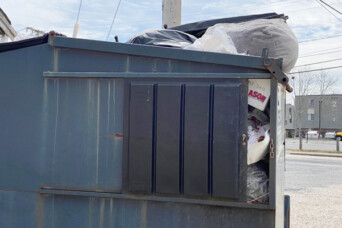Small Business Advocacy Corporate concentration has permeated one of our most basic essential services – waste removal – and that has implications for everyone
The waste removal industry is dominated by a few large companies, which can lead to higher prices and less competition. When you choose a locally owned waste removal company, you'll likely get a more affordable and pleasant experience.

- Post Date
- Mon, Apr 5
- Small Business Advocacy
When delving into the issue of modern day monopoly power, much of the recent global focus has been on the tech world – Google, Apple, Facebook and yes, Amazon – but corporate concentration has also permeated the operations of one of our most basic essential services that we rely on for a clean community and a clean environment: rubbish removal.

Over the past five decades the $139 billion waste industry in the United States has gone from a vast network of locally owned firms who disposed of residential waste at municipal dumps to a centralized system dominated by heavily capitalized and publicly traded companies like Waste Management, Republic Services (formerly BFI), Advanced Disposal Services and Casella Waste Systems. Unbeknownst to most people, these companies now not only control half of the hauling contracts in the United States, but they also control most of the facilities where our trash and recyclables end up: the landfills and Materials Recovery Facilities.
By the beginning of the 21st century, the waste industry became known for its mergers, acquisitions, and consolidations, as the Big Waste companies gained more and more hauling market share.
But the way in which they came to dominate the market is through vertical integration or acquiring other fundamental components of the waste industry – landfills – that enabled them to gain further competitive advantage (and some who once only owned landfills are now getting into the hauling game). Gone are the days of municipal ownership of landfills, and the privatization of this service has negative implications for locally owned waste removal companies.
According to Jim Thompson of Waste Business Journal, as the landfills get scarcer (in 1985, there were approximately 8,000 landfills. Today, that number is closer to 1500), “the guys who own those landfills have a lot more power. They are the gatekeepers. And that power they could use to gain market share and force companies to sell out to them. That will be a further accelerant of the industry consolidation.”
For a small hauler on Cape Cod, owning a landfill is simply not an option. It is an expensive and daunting process, permits are limited, and quite frankly, we are running out of space for this type of land use in the Northeast. Ultimately, a trash hauler needs a place to put their trash, so they have no choice but to rely on their competitors to get rid of their materials, and they pay a premium to do it.
Landfill ownership not only enables big companies to charge their smaller competitors more for a large component of the process, but it also gives them a competitive edge in bidding for collection and hauling contracts against companies that have to pay disposal fees to landfills. What’s more, they also have access to important information about their competitors’ business – the amount of trash a hauler disposes of directly relates to the number of and type of customers they have.

As this cost of business continues to increase, smaller companies have no choice but to charge more for their service. This leaves them vulnerable to their larger corporate competitors who can keep their prices low to attract customers and government contracts. Once the large corporation has put the smaller competitor out of business and established market dominance in an area they can then raise their prices; the people in that community have no other choices left, so they have to accept it. This is evidenced by the dramatic reduction in prices experienced by San Jose, California, and Broward County, Florida, when they introduced competition into a previously monopolized system.
In spite of all that is stacked against them – running up against corporate power, huge capital expenses and grueling work – the Cape’s locally owned waste removal companies like Pina Sanitation Services, Macomber’s Sanitary Refuse Company and Brothers Disposal are making it work. This is because as a former local owner, “there is still the desire to live the dream of being an entrepreneur and to play an important part in the community.” Many local companies pride themselves on the fact that they provide high quality service, but they are also invested in this community, giving back whenever they can. For local companies like theirs it is about more than just the bottom line and returns for shareholders. It is about providing an essential service, jobs, and charitable works for a place they love.
The reality is, waste removal is fundamentally a hyper local issue, and thus local and state governments have the ability to create a waste system that will be good for both local businesses and consumers in the long run. They can do this by limiting the number of hauling licenses and landfill permits one company can have to encourage competition. When possible municipalities can maintain local ownership of landfills or require more transparency from those that are privately held (for example, Covanta, a large corporation who now operates the Yarmouth Transfer Station has raised disposal prices on commercial haulers significantly without explanation). And rather than prescribing to a “bigger is better” attitude, foster and support the locally owned and mission-driven companies like those on Cape Cod.
This article (which has been updated in 2023) was part of a year-long investigative series performed by Amanda Converse in 2021 that explored how corporate concentration has affected various industries across the country and what impact that can and does have on Cape Cod’s local economy. The work was supported by the 2021 Mission Supporters: Cape Cod 5, Nauset Disposal, Mid-Cape Home Center, and Duffy Health Center.
Related articles
- Post Date
- Sat, Aug 31
- Small Business Advocacy
- Post Date
- Wed, Aug 21
- Small Business Advocacy

